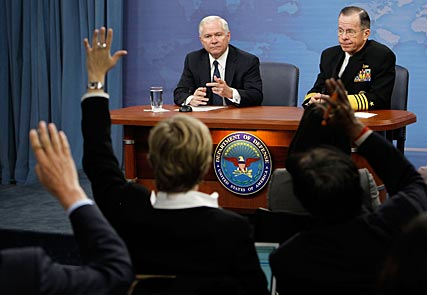Tough Words for General Against 'Don't Ask, Don't Tell'
-
WASHINGTON (March 25) – The U.S. military's internal struggles over homosexuality in the ranks were on full display today, as top officials announced new and relaxed policies for enforcing restrictions on service by gays while rebuking a three-star Army general for publicly defending the old policies.
Defense Secretary Robert Gates and Adm. Mike Mullen, the chairman of the Joint Chiefs of Staff, charged that Lt. Gen. Benjamin Mixon ignored written directions that senior uniformed leaders should keep their opinions of the longstanding "don't ask, don't tell" policy on gay service within the military's chain of command.

Defense Secretary Robert Gates, left, takes questions during Thursday's press briefing. Adm. Michael Mullen, chairman of the Joint Chiefs of Staff, is at right.
In a March 8 letter to Stars and Stripes, the armed forces daily newspaper, Mixon said President Barack Obama's call for repeal of the law is "ill-advised." He urged troops, military families and veterans who share his sentiments to "write your elected officials and chain of command and express your views."
That advocacy crossed a line, Mullen told reporters. He said senior officers are obligated to follow policies enunciated by the president; those who feel they can't have the option to "vote with your feet" and retire from service.
Mixon's future in uniform is "up to him," Mullen added.
The lieutenant general had no immediate response.
Mixon is not the only high-ranking officer to question Obama's call for repeal of "don't ask." But others who've spoken up, including Marine Corps Commandant Gen. James Conway, have done so in response to questions from members of Congress.
Federal law and longstanding military customs give Conway and other members of the Joint Chiefs of Staff leeway to differ publicly with the president on policy questions when lawmakers ask for their personal views.
Mullen announced in February that he supports Obama's plan to repeal "don't ask" but also backs an ongoing Pentagon study of how best to integrate openly gay troops into the force. Repealing the law "with haste could easily generate a very bad outcome," he cautioned today.
While the administration presses for repeal, Republican congressional leaders, along with some conservative Democrats, have indicated they'll fight to preserve "don't ask," in part because they believe repeal now would disrupt a force already strained by ongoing wars in Iraq and Afghanistan.
Gates said that while Congress considers Obama's call for repeal, the Pentagon will enforce the law using "a greater measure of common sense and common decency." He disputed suggestions that the new enforcement guidelines constitute a moratorium on enforcement.
Among other things, those policies limit the use of hearsay testimony in proceedings against allegedly gay troops and bar investigations of alleged gays based on anonymous complaints. The new rules also require that a general or admiral authorize all formal investigations of homosexual conduct and that investigations be led by officers at the rank of colonel or above.
The military discharged 428 officers and enlisted members last year for violating "don't ask." Officials could not supply figures for the number of troops currently under investigation, but Gates said all pending cases will be "reinitiated and re-evaluated" under the new enforcement guidelines.
The changes are "a solid first step to help rein in many of the abuses" in enforcement since "don't ask" was adopted in 1993, said Alexander Nicholson, a former U.S. Army interrogator who was discharged under the policy.
Nicholson, who heads Servicemembers United, an organization of gay and lesbian troops, urged Congress to repeal the law immediately, without waiting for results of the Pentagon's review of the possible effects of that move.
But Elaine Donnelly, a conservative activist who runs the Michigan-based Center for Military Readiness and has been an outspoken opponent of service by gays, said the new Pentagon enforcement guidelines "will undermine respect for the law."
Donnelly also blasted Mullen's rebuke of Mixon, calling it "ironic that Adm. Mullen has criticized a three-star general for expressing a personal view in support of the 1993 law, even after Mullen himself expressed a personal opinion favoring repeal. … This appears to be a double-standard that is not helpful."